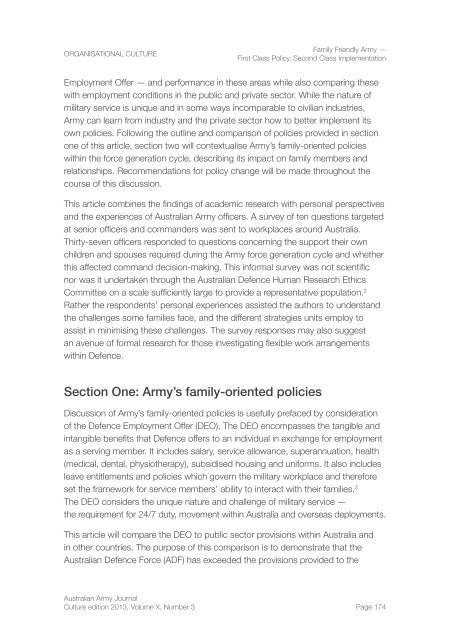Australian Army Journal
Australian Army Journal
Australian Army Journal
You also want an ePaper? Increase the reach of your titles
YUMPU automatically turns print PDFs into web optimized ePapers that Google loves.
ORGANISATIONAL CULTURE<br />
Family Friendly <strong>Army</strong> —<br />
First Class Policy, Second Class Implementation<br />
Employment Offer — and performance in these areas while also comparing these<br />
with employment conditions in the public and private sector. While the nature of<br />
military service is unique and in some ways incomparable to civilian industries,<br />
<strong>Army</strong> can learn from industry and the private sector how to better implement its<br />
own policies. Following the outline and comparison of policies provided in section<br />
one of this article, section two will contextualise <strong>Army</strong>’s family-oriented policies<br />
within the force generation cycle, describing its impact on family members and<br />
relationships. Recommendations for policy change will be made throughout the<br />
course of this discussion.<br />
This article combines the findings of academic research with personal perspectives<br />
and the experiences of <strong>Australian</strong> <strong>Army</strong> officers. A survey of ten questions targeted<br />
at senior officers and commanders was sent to workplaces around Australia.<br />
Thirty-seven officers responded to questions concerning the support their own<br />
children and spouses required during the <strong>Army</strong> force generation cycle and whether<br />
this affected command decision-making. This informal survey was not scientific<br />
nor was it undertaken through the <strong>Australian</strong> Defence Human Research Ethics<br />
Committee on a scale sufficiently large to provide a representative population. 2<br />
Rather the respondents’ personal experiences assisted the authors to understand<br />
the challenges some families face, and the different strategies units employ to<br />
assist in minimising these challenges. The survey responses may also suggest<br />
an avenue of formal research for those investigating flexible work arrangements<br />
within Defence.<br />
Section One: <strong>Army</strong>’s family-oriented policies<br />
Discussion of <strong>Army</strong>’s family-oriented policies is usefully prefaced by consideration<br />
of the Defence Employment Offer (DEO). The DEO encompasses the tangible and<br />
intangible benefits that Defence offers to an individual in exchange for employment<br />
as a serving member. It includes salary, service allowance, superannuation, health<br />
(medical, dental, physiotherapy), subsidised housing and uniforms. It also includes<br />
leave entitlements and policies which govern the military workplace and therefore<br />
set the framework for service members’ ability to interact with their families. 3<br />
The DEO considers the unique nature and challenge of military service —<br />
the requirement for 24/7 duty, movement within Australia and overseas deployments.<br />
This article will compare the DEO to public sector provisions within Australia and<br />
in other countries. The purpose of this comparison is to demonstrate that the<br />
<strong>Australian</strong> Defence Force (ADF) has exceeded the provisions provided to the<br />
<strong>Australian</strong> <strong>Army</strong> <strong>Journal</strong><br />
Culture edition 2013, Volume X, Number 3 Page 174

















